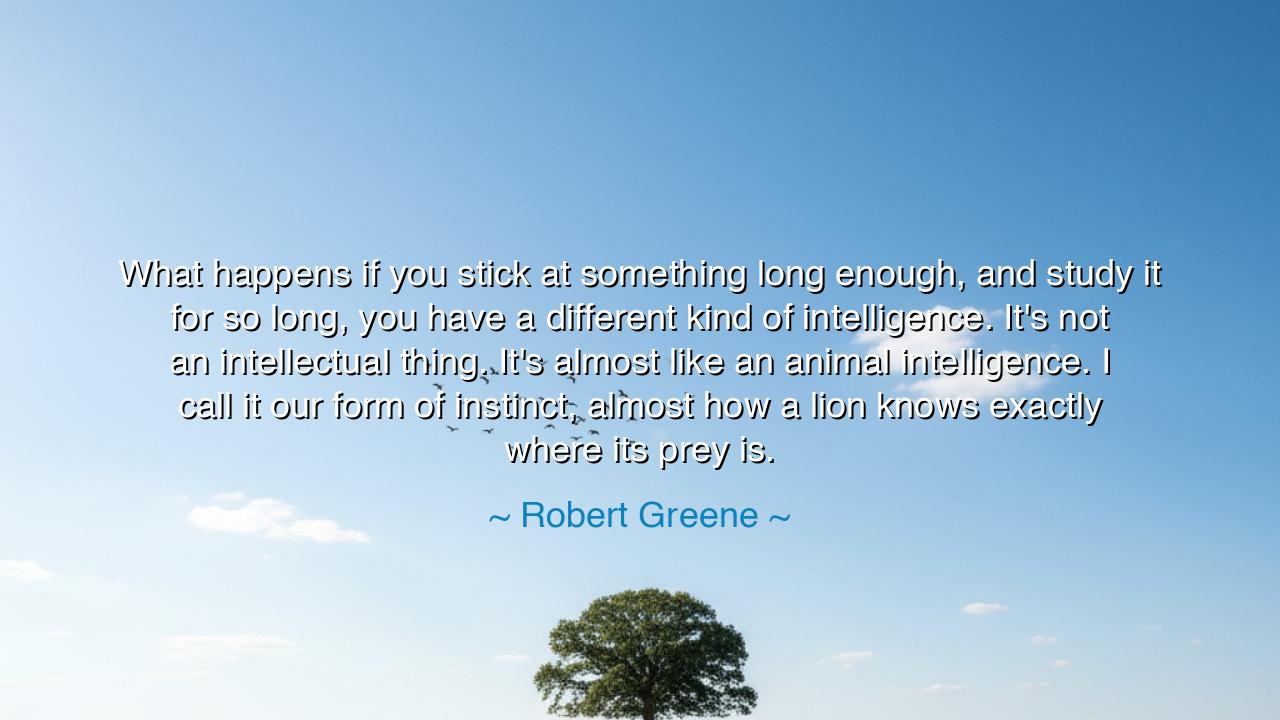
What happens if you stick at something long enough, and study it
What happens if you stick at something long enough, and study it for so long, you have a different kind of intelligence. It's not an intellectual thing. It's almost like an animal intelligence. I call it our form of instinct, almost how a lion knows exactly where its prey is.






The words of Robert Greene, master observer of human nature and author of The 48 Laws of Power, speak to a truth that transcends time: “What happens if you stick at something long enough, and study it for so long, you have a different kind of intelligence. It's not an intellectual thing. It's almost like an animal intelligence. I call it our form of instinct, almost how a lion knows exactly where its prey is.” In these words lies the wisdom of the ancients, the secret of mastery — that discipline, when pursued beyond thought, transforms into instinct. Greene reminds us that true intelligence is not merely born of books or logic, but of devotion, observation, and the relentless honing of one’s craft until the boundary between mind and body disappears.
The origin of this teaching rests in Greene’s lifelong study of mastery and human behavior. He spent years examining the habits of the great — warriors, artists, strategists, and thinkers — and found that beneath their brilliance lay not luck or genius, but endurance. When one immerses himself fully in an art, a science, or a skill, the mind ceases to struggle. What once was effort becomes flow; what once was analysis becomes intuition. The master no longer thinks about the craft — he becomes the craft. This is the transformation Greene calls a new kind of intelligence, one that lies deeper than intellect: the instinct of understanding born from long and faithful labor.
In the days of old, the warriors of every tribe knew this truth. The swordsman, after years of practice, no longer calculated his strike; his body moved before the thought could form. The hunter did not reason where the deer would turn — he simply knew. The calligrapher, the sculptor, the archer, the poet — each, after countless repetitions, found that the mind became silent while action became perfect. It was as though the soul itself had learned to see. This is the animal intelligence Greene speaks of — the instinct of the awakened being, where wisdom is no longer in the head but in the marrow of one’s bones.
Consider the tale of Miyamoto Musashi, the legendary samurai of Japan. In his youth, he sought victory through brute strength and fierce intellect. But as the years passed, through countless duels and meditations, he reached a higher plane of mastery. Musashi once wrote, “The Way is in training.” By this, he meant that mastery comes not through talent or trickery, but through endless practice that purifies the senses. In time, Musashi could sense the intention of an opponent before the sword was raised. He no longer fought — he flowed. His mind had become quiet, his body one with the movement of the universe. He embodied the lion’s instinct that Greene describes: the perfect harmony of awareness and action.
Yet Greene’s insight carries another layer of meaning. He reminds us that in a world obsessed with intellect and information, there exists a deeper wisdom — one born not of thinking but of being. True mastery does not come from the endless gathering of facts, but from the shaping of the self through experience. The scholar may know a thousand theories, but the craftsman who has felt the weight of the hammer, the flow of the woodgrain, and the rhythm of the work knows something no book can teach. This is embodied knowledge, the kind that lives in the muscles and the breath. It is the mind made flesh — the intellect transmuted into instinct.
The lesson here is both humbling and liberating: greatness is not found in sudden genius, but in patience and persistence. One must stay with the work long enough to cross the threshold where reason fades and instinct awakens. To reach that state, you must love the path more than the prize — for it is the path itself that transforms you. Every repetition, every failure, every small refinement is a step toward becoming one with your art. And when that moment comes, when you no longer struggle but simply act — then you have touched what Greene calls the “animal intelligence.” It is not primitive; it is pure. It is the mind returned to harmony with nature.
So, O seeker of mastery, take heed: do not chase brilliance; chase understanding. Stay with your craft when others grow weary. Practice when no one watches. Listen, observe, and allow your senses to sharpen until thought and movement become one. Whether you are a painter, a leader, a warrior, or a dreamer — commit yourself wholly. For in time, you will feel the stirring that Greene describes: the instinct of the lion, the unspoken knowing that guides without words. And when that happens, you will no longer need to think — for you will become the very intelligence that once you sought. This is the highest form of mastery — the merging of man, mind, and destiny into one eternal act of creation.






AAdministratorAdministrator
Welcome, honored guests. Please leave a comment, we will respond soon